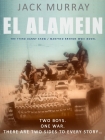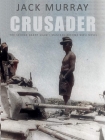El Alamein, Jack Murray [best autobiographies to read .txt] 📗

- Author: Jack Murray
Book online «El Alamein, Jack Murray [best autobiographies to read .txt] 📗». Author Jack Murray
‘No, I haven’t seen him. I think his tank was hit but I don’t know where he ended up. We’re all over the place at the moment.’
After Gerhardt had left, Manfred returned to the tank. The campfire flickered in the light breeze, casting distorted shadows against their battered tank. Basler sat alone, reading. He’d managed to find a battered copy of David Copperfield. In English. He sat reading it with a small dictionary beside him which he referred to every so often.
They were joined by Lieutenant Stiefelmayer. His arrival prompted Basler to set his book down and get to his feet.
‘Sorry, I appear to be interrupting your Anglophile tank commander,’ said Stiefelmayer, archly. Manfred grinned but made sure that Basler did not see this. Basler ignored his friend. and they went off towards a group including Kummel and Teege.
Manfred slumped to the ground wearily. They were all underneath a makeshift tent attached to the hull of the tank. Jentz was snoring like the trooper he was. Klef was sleeping, too. He was as silent in slumber as he was in the tank. Kiel was awake, staring straight up into the night sky. Perhaps he was avoiding sleep, thought Manfred, fearful of seeing the men he’d killed reappear in his dreams. Manfred wanted to say something to him. He started towards him but then stopped. Even in the dim light he could see the tears glistening in the young man’s face. Manfred turned away. He didn’t want the boy to know he’d seen him. Anyway, what was there to say?
-
The next few days saw the regiment slowly reconfigure. This required Manfred’s tank to go in search of the supply train which they located early afternoon the next day. They were still low on fuel and priority was given to refitting damaged Panzers to bring up the regiment strength. Early morning of the 29th saw the return of Fischer and a number of the stranded tank crews.
‘My tank lasted five minutes,’ laughed Fischer. ‘We were one of the first to be hit. The firing started from the Tommies. We were hit immediately. The tank began to brew up. We were lucky; all of us escaped. Shells raining down on us and you lot heading off into the distance. I don’t like that new tank the British have.’
‘Have you seen it?’ asked Gerhardt. ‘Ugly looking thing.’
‘Not very practical,’ added Manfred draining his coffee. ‘The seventy-five can only fire in one direction.’
‘Really?’ laughed Fischer who had yet to see the new addition to the enemy tank armoury. ‘Why did they do that?’
‘I’ll ask Churchill next time I see him,’ replied Gerhardt.
‘Do that,’ agreed Fischer, ‘and tell him to give up while you’re at it. You’re going to lose.’
Manfred wondered if Fischer really believed they would win. Confronting the new tank had been a reminder that the Allies were only going to grow more powerful. They had the industrial might of the Americans and the manpower of the Commonwealth to support them. Meanwhile Germany was divided between two fronts. No one spoke of the fear they all felt: the war had already been lost.
‘Has any mail come?’ asked Fischer.
‘No. Haven’t seen Marseille recently. He usually brings it,’ replied Manfred.
‘So we’re stuck here,’ said Gerhardt looking around the camp a little forlornly. ‘Has anyone got a football?’
-
They stayed a week in the assembly areas. Rommel, for once, decided to be patient and use the time to allow the divisions to regain their strength, match up displaced crews with new tanks and strengthen their supply lines for the next stage of their push.
Shelling from enemy artillery was frequent but sounded more menacing than dangerous. It was notice of what they would face in the future when they pushed east. Occasional visits by the RAF posed more of a problem and a number of bombing runs on the assembly areas had caused greater damage.
These aerial attacks halted as the Khamsin attacked the invaders. Once again North Africa and Mother Nature posted a reminder that the greatest enemy either side faced was not to be found wearing a uniform. The end of May and early June saw both sides enveloped in a hot, dusty wind from the south that made life wretched for all who faced it. The oven-hot wind scorched and blinded and choked. It infiltrated nostrils, clothing, food and drink. By the time its hateful intensity was abating, most soldiers were ready to sue for peace.
With the weather once more returning to merely intolerable, the 4th of June saw the regiment ready to march again. Orders came through that they had to clear minefields southwest of Bir el Harmat. This would allow the Afrika Korps to outflank the defensive boxes on the Gazala line which defended the desert route into Tobruk. This was always assuming that the Allies did not attack first.
Manfred sat on the top of the tank and listened to the nearby eighty-eights pulsing repeatedly to targets somewhere in the distance. Out of curiosity he asked to borrow the binoculars of Basler.
‘Be quick, we’ll be leaving soon.’
The field glasses were the most powerful he’d used. Basler must have had good contacts in supply to snaffle these. No wonder he wanted them back. Manfred moved his view down to look at the artillery ranged a hundred yards in front of them. There were half a dozen guns. But only two of them were firing. He scanned along the line and looked at the gunners. They were all eating food. Lunch break in the middle of war.





Comments (0)